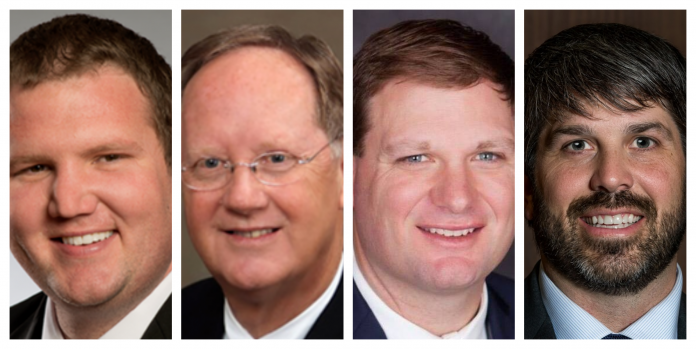
MONTGOMERY, Ala. – As the Alabama Legislature gears up for the 2020 session starting Feb. 4, The Tribune takes a look at bills set to be considered and talks to Cullman County’s state legislative delegation about bills they plan to introduce, including one to increase the Cullman County Commission from three seats to five and one to alter the county’s tax structure.
The 10 bills drawing the most statewide attention include (in the order in which they are trending in online sources, starting with the “hottest”):
- House Bill (HB) 39, the highest trending bill, would create a single “statewide standardized process” for the issuance of concealed carry permits, in place of the various mechanisms used by individual counties. The system would be maintained by the Alabama Law Enforcement Agency (ALEA), and would be linked to the driver’s license system. Applications for permits would continue to be made and processed through county sheriff’s offices.
- HB 35, which “would provide that public K-12 schools may not participate in, sponsor or provide coaching staff for interscholastic athletic events at which athletes are allowed to participate in competition against athletes who are of a different biological gender, unless the event specifically includes both biological genders.” At events intended for a single biological gender, students would only be allowed to compete according to the sex indicated on their birth certificates.
- HB 43, which would allow Baldwin County to levy a tax of up to 10% on “alternative nicotine products and electronic nicotine delivery systems,” as well as industrial hemp and hemp products like CBD oil, except those used for medicinal, agricultural or manufacturing purposes. Tax revenues would be used to create a mental health diversion program through a “mental health court” within the county circuit court.
- HB 45, which would create regulations to govern microblading (eyebrow tattooing) and microblading facilities. The bill would require facilities to be licensed and technicians to be certified, and would prohibit the microblading of minors without a parent’s permission.
- HB 36, which would expand protections for “critical infrastructure” like power plants, transmission towers, water facilities and others by including pipelines under the definition of critical infrastructure, and by prohibiting the use of drones at altitudes of less than 400 feet over such facilities except by certain authorized persons.
- HB 20 is similar to HB 35 in that it provides that “no public K-12 school may participate in, sponsor, or provide coaching staff for interscholastic athletic events at which athletes are allowed to participate in competition against athletes who are of a different biological gender, unless the event specifically includes both biological genders; and to provide that neither the state or any of its political subdivisions may use or permit or allow to be used any property that it owns or controls for interscholastic athletic events at which athletes are allowed to participate in competition against athletes who are of a different biological gender, unless the event specifically includes both biological genders.”
- HB 3, which proposes an amendment to the state Constitution for a sweeping move “to eliminate the business privilege, inheritance and estate taxes and income taxes.” Additionally, according to the bill, “The Legislature shall enact general laws as necessary to implement a single rate consumption tax in Alabama. These laws shall include provisions to repeal the current state sales (and) use taxes, rental and lease taxes, lodgings tax, utility gross receipts tax, corporate tax income tax, individual income tax, mortgage and deed taxes, financial institutions excise tax, business privilege tax and insurance premium tax and replace all revenue generated from these taxes with a broad-based single rate tax based on consumption expenditures contributing to Alabama’s Gross Domestic Product (GDP). The single rate consumption tax rate shall also replace state tax revenues allocated to local governments as well as levied tax revenues which are collected using the same basis as the current state taxes.”
- Senate Bill (SB) 40, which would continue the existence and functioning of the Alabama Athletic Commission until Oct. 1, 2021.
- SB 10, which would set a cap on tuition benefits paid to certain members of the National Guard, allowing reimbursements to students at private colleges to equal only the amount of tuition charged at the currently most expensive public institution in the state. The bill would also extend tuition benefits to high school students who are Guard members and are in dual enrollment educational programs.
- HB 51, which would “establish a preference for bidders on state contracts which are geographically disadvantaged business enterprises and would require state contracts for goods or services to be let to geographically disadvantaged business enterprises if the bid is within three percent of the lowest responsible bid.” “Geographically disadvantaged business enterprises” are defined as those located in “opportunity zones” with 20% poverty rates and average incomes less than 80% of the regional median income.
Bills prefiled by Cullman County’s state legislative delegation
Rep. Scott Stadthagen, R-Hartselle filed HB 25, which would increase the crime of eluding a law enforcement officer from a Class A misdemeanor to a Class C felony. In cases where the flight or attempt to elude causes death or physical injury to an innocent person, the bill would change the crime from a Class C felony to a Class B felony.
Stadthagen also sponsored HB 34, which amends current law concerning driving without a license. Current law allows law enforcement officers to remove a person from a vehicle and impound the vehicle if the person has a suspended or expired driver’s license. The amendment would extend the penalty to persons who have never procured a driver’s license.
Once the session starts
Sen. Garlan Gudger, R-Cullman; Rep. Corey Harbison, R-Good Hope; and Rep. Randall Shedd, R-Fairview have not prefiled bills. Bills do not have to be prefiled, though, and can be introduced during the session.
Shedd told The Tribune about legislation he is working on, including a bill for the Alabama Department of Senior Services that would make establishing a quorum easier, a possible bill to make improvements to the ALDOT Accountability Act and an unspecified bill requested by the Cullman County coroner.
Shedd also said, “I’m working closely with House Majority Leader Nathaniel Ledbetter on mental health and will either be helping him with his mental health legislation or I will introduce it if he needs me to.
“I’ve been chair of the Committee working on improving service and reducing wait times in the driver’s license exam offices in the state. I’m working on a bill dealing with that issue that I plan to introduce.
“We’re discussing several local bills. I expect one I will introduce is legislation to change the county commission in Cullman County to a five-member commission. Most likely it would be full-time chair with part-time commissioners required to live in the four areas of the county- northwest, southwest, northeast, southeast portions of the county- so that every area of the county has an opportunity to have representation on the commission.”
Harbison told The Tribune that he plans to introduce two bills, including a local bill that would modify the tax structure in Cullman County, so that newly-incorporated municipalities would have to generate their own tax bases instead of drawing from the tax pool shared by all municipalities.
“We’re the only county in the state set up like we are,” he said. “You’ve got a county-wide sales tax that everybody basically shares off of. All other counties in the state, they’ve got a small county tax, plus each municipality has their own tax within their municipalities.”
All currently-existing municipalities would continue to share the tax as they have done.
Harbison also plans to introduce a statewide bill that would require municipalities establishing their own school systems, separate from their county systems, to fund their own central offices and central office staffs from federal or local sources. Teachers and classrooms would continue to be state-funded.
Harbison said, “Every time a city school (system) forms and breaks away, the state has been putting money into their central office for administrative staff for administrative cost, which is equivalent to $250,000 to $300,000 a year per city system that we’re paying out of the Education Trust Fund into administrative cost to these new central offices.”
Harbison estimates that the state currently spends up to $20 million per year on “duplicated services.”
Currently existing municipal systems would not be affected.
Gudger, who reported that he has been appointed to a legislative mental health commission with Shedd and Stadthagen, told The Tribune that he is working on a mental health bill: “My goal on that is to be able to pull some mental health funding so that we are able to do that into the school systems so they have counselors inside the school system.”
Gudger said that he also plans to introduce a bill to require licensing of vaping shops.
“Right now, they don’t pay any licensing fees, registration fees; they’re not regulated by the state,” he said. “They’re kind of just the wild, wild west, and I just want to kind of get them under some type of like an ABC-type control, that somebody’s just regulating them, doing sting operations like they do with alcohol, and just making sure that they’re selling to the right people.”
Gudger expressed particular concern about vaping among minors.
The senator also said that the small business commission to which Lt. Gov. Will Ainsworth appointed him hopes to produce some small business legislation during the session.
In recent local presentations:
Stadthagen said that, in his role on the mental health commission, he will be working on the Stepping Up Initiative, which is intended to reduce the number of mentally ill persons in jails and prisons.
Shedd mentioned several issues he expects the Legislature to take on, including gambling, medical marijuana, prisons and prison reform, rural health care, Medicaid expansion, the education budget, the general fund budget and mental health.
Harbison talked about medical marijuana, saying, “I’m interested to see what comes out of the final studies on that, because if it helps people and gets them off of other prescription medication, me personally, I would be willing to entertain what helps people. That’s what we are down there to do, is to help people do what’s best.”
Harbison also expressed concern about what he referred to as the “monopoly” on gaming held by the Poarch Band of Creek Indians, and mentioned the idea of a lottery, saying, “Whatever we do with that, it will be a constitutional amendment and the people will get the final vote to decide what they want to do.”
Gudger said he will push for projects to resurface County Road 1564 (Welcome Road) in Fairview and Alabama Highway 69 near Bremen. He also expressed concerns about a lottery.
Copyright 2020 Humble Roots, LLC. All Rights Reserved.



























